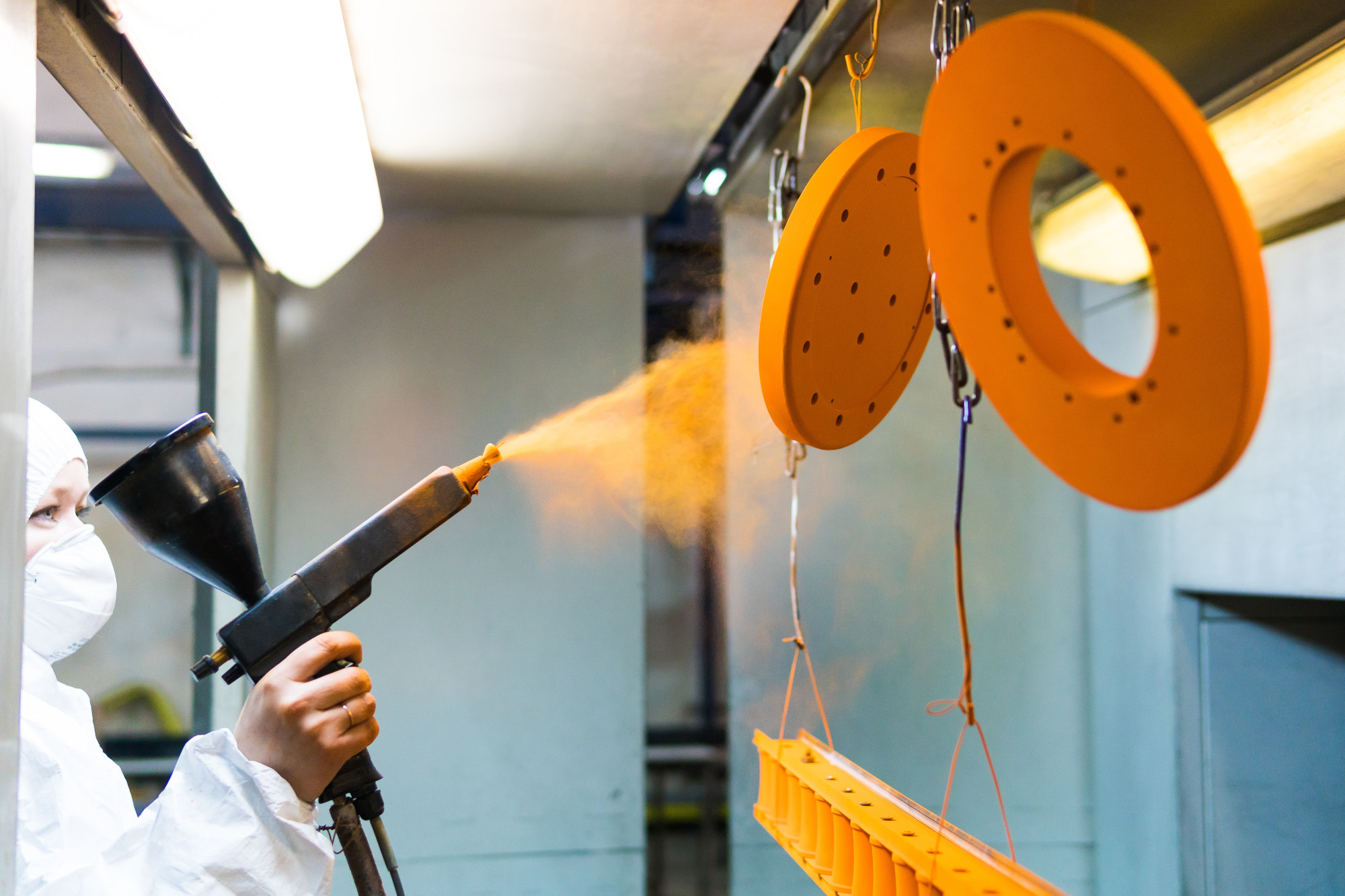posted by Custom Coatings, Inc. on June 17th, 2022
Your Complete Guide to Heavy Industrial Equipment Painting
Industrial painting company | industrial painting experts | Machinery Coating
Painting industrial equipment might seem like a decorative folly. But perhaps your team has worked on these machines just fine for months or even years? So what exactly could a paint job do to improve the quality and productivity of your facility?
In truth, painting is a necessary aspect of maintaining industrial equipment. It protects the exterior of your systems from environmental factors.
That said, here are some of the most notable advantages of heavy industrial equipment painting.
Improve the Appearance
Over the years, as your equipment starts to wear, its age will become more apparent to the eye.
A paint job can improve your equipment’s appearance which goes a long way to communicate reliability and professionalism to customers.
It’s a simple thing to do to improve your rapport with potential clients. You can also choose a color palette for your equipment that represents your brand.
Prevent Rust and Corrosion
Corrosion is a global problem and one you shouldn’t ignore in your facility. Every year, metallic corrosion claims a cost of almost $300 billion globally.
An industrial equipment coating can protect your machinery against weather damages. It’s effective against acid rain, salt, and air and could even block UV to prevent sun fading.
As a result, paint helps to make your equipment resistant to rust and corrosion. Unfortunately, these often lead to machine failure, resulting in unnecessary downtime and extra costs.
A special coating system can lower expenses by reducing the need for maintenance.
Ease of Maintenance
Painted equipment doesn’t just reduce the need for maintenance. It also makes maintenance much easier to complete. Dirt can’t penetrate a shiny paint surface, so it’s easier to wipe down your equipment and leave it looking new.
Higher Resale Value
Your industrial equipment has a “curb value,” which will improve with a thorough, good-looking paint job.
It stands to reason that selling older equipment is easier when it’s neatly painted and looks new. After all, potential customers can tell it’s well-maintained.
Prevent Fires
An increasing number of industrial paints now include an intumescent fireproofing layer.
This protects equipment from spreading fires because it doesn’t allow flames to spread, thus reducing potential damage to your facility. There are two types of fire-preventing paints.
Soft char holds moisture and releases steam when exposed to high heat, slowing the fire. Hard char forms a firewall by melting into graphite and sodium silicate.
Reduce Energy Consumption
An often overlooked benefit to painting your heavy equipment is that it can help keep your equipment cool.
Unfortunately, many facilities rely on air conditioning and cooling systems, which can be expensive and contribute to a higher carbon footprint.
Reflective industrial paints bounce heat from walls rather than absorbing it.
The coatings are usually light-colored and formulated with chemical compounds to deflect sunlight and heat. This helps facilities become less reliant on HVAC systems and is a much more inexpensive method.
Key Considerations When Selecting Industrial Coating
The best industrial painting formulations are custom-made to reflect the environment and parts it’s for. That’s why it’s essential to consider all critical factors when creating the coating.
Key factors include:
The substrate: The substrate is the material that the paint will adhere to. Specific substrates don’t take to paint as easily as others. As such, they might require a primer before the paint job begins.
Others are well-suited combinations, and the paint and substrate will stick together well. The substrate informs whether the coating will require acrylic, urethane, epoxy, or other materials.
Application environment: Industrial coatings require a particular application environment to be applied effectively.
This should be stable and clean with consistent temperature and humidity conditions. Significant variations can lead to inconsistent finishing results.
For example, warm, industrially active days contrasted with cool nights can result in thermal shock.
Coating properties: Most importantly, the industrial paint coating must exhibit a range of coating properties that match the equipment’s requirements.
Should the coating provide corrosion resistance, temperature resistance, or food safety compliance?
On top of this, there are aesthetic considerations, such as the smoothness, texture, and gloss of the paint, coating flexibility, moisture permeability, and color quality, specificity, and retention.
With that said, there are some key steps that go into the industrial painting process.
1. Preparing the Substrate Surface
For industrial paint to take hold, the base material must first be prepared. It must be spotless of dust, debris, chemicals, and other contaminants.
A primer may also be needed to ensure the coat of paint will adhere to the substrate.
Poorly prepared surfaces can lead to a range of issues with industrial paint. For example, blistering, adhesion failure, and bubbling.
2. Selecting the Right Coating System
Next, industrial painting professionals will choose the most effective method of coating. Key factors include the size and complexity of the equipment. Popular coating processes include:
- Spray coating
- Powder coating
- Dip coating
- Brush coating
There’s also roll-to-roll coating to consider.
3. Curing and Drying
Each coating has its own drying and curing requirements. These must be carefully observed before another coat of paint is added or the equipment is returned to work.
4. Inspection
At the end of the painting process, each part undergoes inspection to ensure the job is completed satisfactorily. Industrial paint jobs have to offer a certain degree of thickness to cover the equipment adequately.
The paint should also not obscure small but complex and necessary details.
Are You Ready to Opt for Heavy Industrial Equipment Painting?
Heavy industrial equipment painting isn’t as easy as taking up a brush and prettying up your equipment.
From the initial surface preparation to selecting the suitable coating properties and the best coating system, many decisions directly impact the quality of the coating.
Custom Coatings Inc. is a commercial painting service in North Carolina. We will paint anything that stands still long enough, meeting your business’s requirements and applications. Get in touch today for an estimate.




